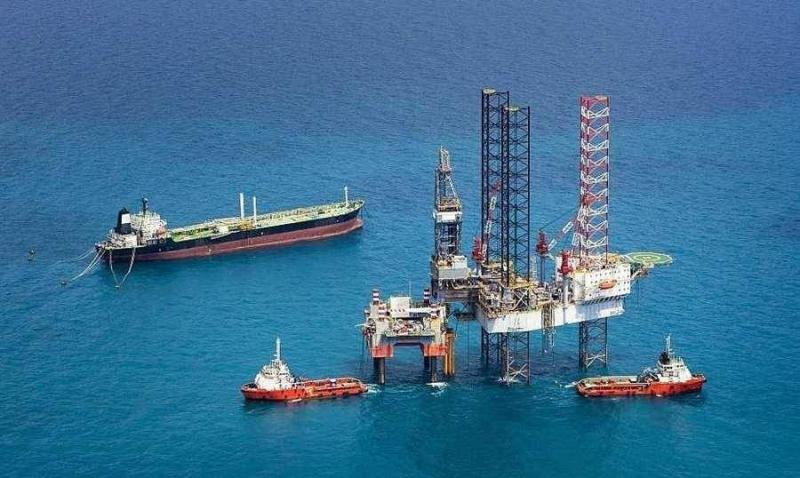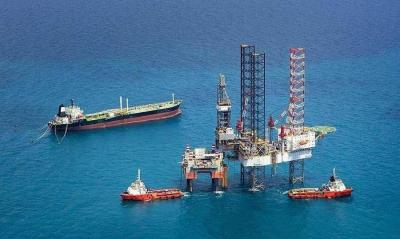Amid political turmoil and fluctuating security concerns in the regions, there is a glimmer of hope with the anticipated arrival of the American drilling platform TransOcean Barents to Lebanon on August 15, unless unforeseen circumstances obstruct its path. After leaving the shores of Malta and sailing from Norwegian waters on July 15, the platform will head directly to the drilling point in block number 9 upon reaching Lebanese territorial waters. It will be joined by a team of approximately 140 technicians, who will be transported directly from Rafik Hariri International Airport to the platform by helicopters.
Minister of Public Works Ali Hamie tweeted on Monday that "the platform will start oil and gas exploration by heading directly to block number 9, and it is expected to arrive before noon on Wednesday, August 16."
After completing the import of all necessary equipment from the logistics base at the Port of Beirut, where it is secured via helicopters and ships, and supplied with cement and clay from Cyprus, the platform is set to commence drilling by early September at the latest. The drilling operation is expected to take between 60 to 70 days to reach the well, which should be sufficient to verify the presence of gas.
The work crew on the platform will be divided into two teams, alternating shifts 24 hours a day for 15 days, followed by a 15-day rest before returning to drilling again. The duration and cost of the drilling operations will depend on the type of rocks and terrain in the area, noting that they will be at a depth of 4,200 meters.
According to exclusive information for "An-Nahar," preparations are underway to receive the drilling platform, with the presence of Ministers of Energy and Water Walid Fayyad and Public Works and Transport Ali Hamie from the caretaker government, along with representatives from "Total Energies," "Eni Italia," "Qatar Energy," and members of the petroleum sector management. Caretaker Prime Minister Najib Mikati is also expected to attend alongside interested parties.
### Completion of Pre-Drilling Procedures
According to informed sources, completing preparations for the platform to commence operations still requires the signature and final approval of Environment Minister in the caretaker government Nasser Yassin on the environmental impact assessment report related to the oil and gas exploration project in block 9 (Qana 31-1) in Lebanon's maritime waters, after sending comments from the technical committee to the Minister of Energy and Water, who will sign the drilling license thereafter.
### Completed Preparations
Meanwhile, "Total Energies" has hired all services and equipment needed for the drilling operations alongside the commencement of drilling, including the logistics base, securing necessary equipment and supplies, contracting specialized companies to transport equipment from the Port of Beirut to the drilling platform via ships, supplying fuel to the platform, and ensuring helicopters to transport the work team.
It is noteworthy that "Total Energies" has resorted to importing some materials from Cyprus via the Port of Limassol, including cement and clay, while these materials are typically manufactured at the logistics base in the country where drilling takes place, in compliance with Article 19 of the Law of the Seas. The company justified this step by stating that these materials are currently unavailable in Lebanon, especially since the August 4 explosion in the Port of Beirut prevented the storage of these materials there. Consequently, the cost of producing them in Lebanon—exceeding $5 million in a short period—was higher than importing them from a nearby port like Limassol. Moreover, the Law of the Seas has no relation to this measure, which is employed due to time constraints and to limit costs associated with securing drilling services.
It is evident that the French company hurried its movement due to various regional and French pressures toward block number 9, following the signing of a maritime border demarcation agreement with Israel, after retreating in 2020 following its completion of drilling in block number 4.
Two ministries are sharing roles in this important and historic issue for Lebanon. The responsibility for the exploration and drilling lies with the Ministry of Energy and Water, while the accompanying logistical tasks fall to the Ministry of Public Works and Transport. The Environment Ministry also has a significant role in the environmental aspect, marking the first time since 1920 (the establishment of Greater Lebanon) that an environmental impact assessment study is conducted with the involvement of municipalities and civil society in two phases in Beirut and Tyre.
In this context, the Minister of Public Works and Transport previously clarified that "the ministry is working according to three main axes: the first is allocating land at the Port of Beirut to serve as a logistics base for storing all necessary supplies for the exploration process, including equipment, materials, vehicles, and devices, and transporting them from land to sea via ships. The second comprises the required approvals for the drilling platform, and the third relates to securing full approvals for "Total Energies" through its agent to prepare helicopters for transporting personnel to and from the drilling site via Rafik Hariri International Airport in Beirut, ensuring a smooth and dynamic process.
It is known that, according to the agreement signed between Lebanon and the consortium of "Total Energies," "Eni Italia," and "Qatar Energy," particularly regarding block number 9, the Lebanese government holds approximately 63 percent, while the consortium holds around 37 percent. The distribution of wealth and shares will begin once production starts. The 37 percent share, which can rise to 42 percent in block number 9, is distributed as follows: 35 percent for operating company "Total Energies," 35 percent for the non-operating company "Eni Italia," and 30 percent for the non-operating company "Qatar Energy."




